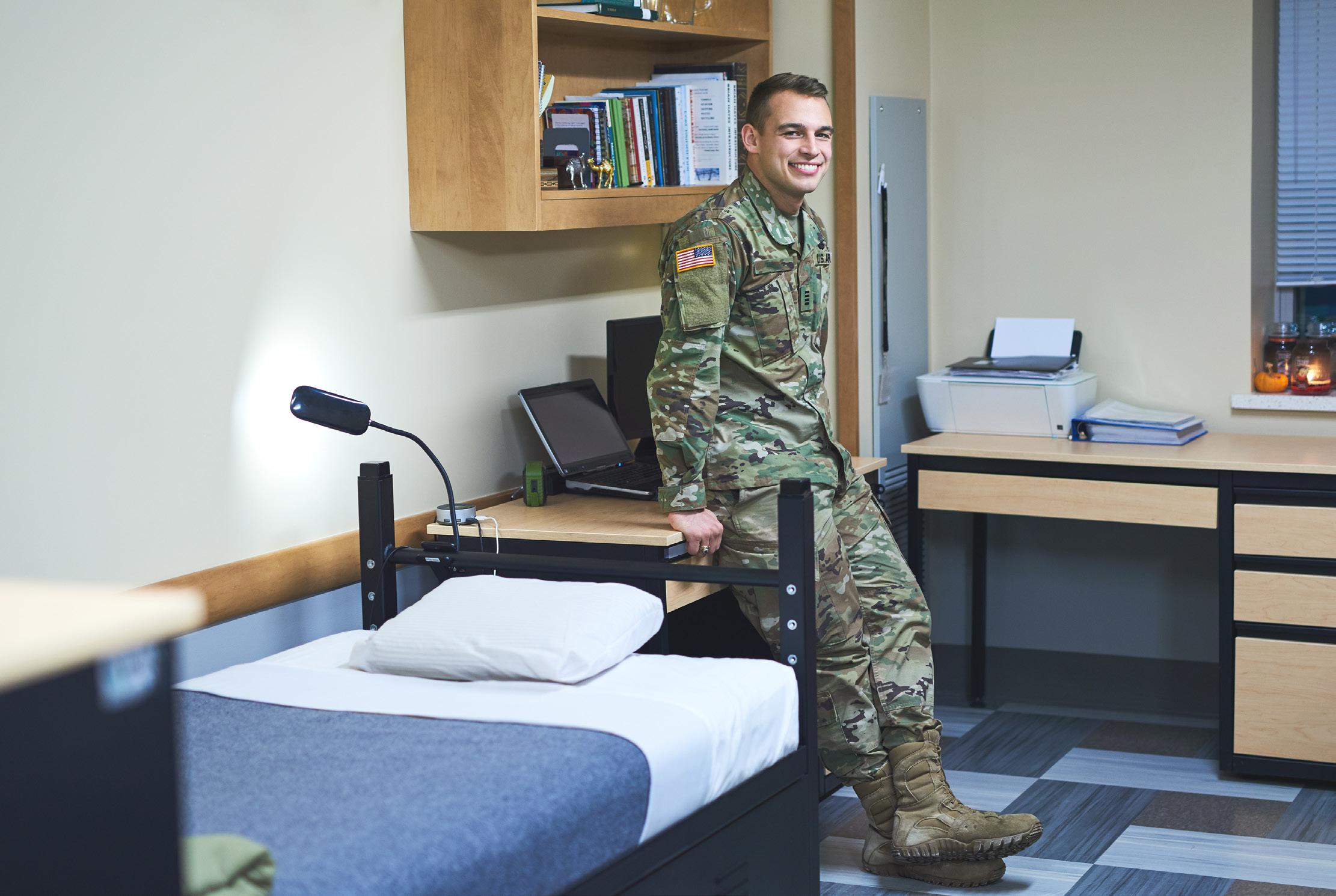





Dear Students and Families,
Welcome to a new college year! There’s nothing like the energy and optimism of fall on campus, whether you’re a first-year or returning student or a supportive family member.
University Living Magazine is here to guide both students and their families throughout the college journey. Our pages are filled with valuable insights, addressing questions you may have (and some you might not have considered yet). Academics, health and wellness, residential and off-campus life, career prep, paying for college — it’s all here!
Students, this is your time to explore, learn, and flourish. Lean into your academic and support resources on campus. Families, while your relationship may be evolving, your role remains critical during this phase of your student’s life. The school’s Parent and Family Program is your go-to resource and we encourage you to engage with it and participate in family programming on campus and off.
The college experience is transformative for all of you and we’re here to support you every step of the way. There’s lots more information on CollegiateParent.com — please visit!
Best wishes,
The University Living Magazine Team at CollegiateParent
Publisher
University Living Magazine is published by CollegiateParent® , a division of College & Military Marketing Group, LLC. Contact: editor@collegiateparent.com
Art Director Kade O’Connor | koconnor@collegiateparent.com
Advertising Inquiries (866) 721-1357 | sales@collegiateparent.com
University Living Magazine Dept# 5934, PO Box 25008 | Bradenton, FL 34206 (866) 721-1357 | CollegiateParent.com
Copyright © 2025 CollegiateParent, LLC. All rights reserved.

– By Scott Sager


During a dash to Home Depot on move-in day with just the two of us in the car, I made my daughter put down her phone and listen as I told her two things: she could call for help, any time, no matter what; and she could bring anyone home as long as they treated her respectfully.
To me, these were the most important messages I could give her to start college and an independent life.
Every parent has something they want their student to take with them — that fundamental nugget of advice or wisdom, a skill or perspective that will help them survive their first year on campus. In addition to thinking about what to tell them is when and how. Move-in day with its distractions and emotions isn’t necessarily the right time for laundry tips or the “make good choices” speech. Luckily, you’ll be staying in touch. Think through what’s vital for your student to know and most important for you to share. Dole out these messages after they’re settled, by phone call, text, or
whatever way you two communicate. Keep the conversations going all year long.
No matter their achievement level in high school, students face new challenges in college, whether it’s a particularly demanding class, managing homework, or having to meet general education requirements that don’t appeal to them.
they could call for help, any time, no matter what
When I asked parents to share their top survival tips, their advice clustered around these important categories:
→ Go to class. Talk with professors and TAs in real life. Don’t over-rely on ChatGPT! (And on that subject, be conscientious about abiding by the school’s, and each professor’s, rules about using AI for your classwork.)
→ Don’t get behind in your work.
→ It’s alright to get help, so use available resources like tutors and the campus writing center.
→ Treat college like it’s your job, at least a little.
Social life has a huge impact on the college experience of even the most serious student. They will rub elbows with people from different backgrounds and be confronted by new values and ideas.
→ Join something — anything!
→ Get out of your room and turn off your screens.
→ Be willing to be challenged by, and to challenge, new friends.
→ Leave your comfort zone — eat with new hallmates or stay after a class for an impromptu discussion.
→ Take time to really get to know people before judging them.
No matter how independent they were in high school, students deal with new tasks and responsibilities at college.
→ Manage your money carefully — pay attention to bank fees and don’t drop below the minimum balance on your debit card.
→ Try to do your laundry and change your sheets and towels once a week.
→ Read and respond promptly to your emails.
→ Ask for help — you won’t know how to do everything.
Stress can take many forms at college. Students often ignore symptoms of illness or signs that pressures are taking a toll. The ups and downs of relationships can make life an emotional roller coaster.
→ Get some alone time every day.
→ Go to the health center before you get sick, just to check it out (and you will get sick, so don’t ignore symptoms).
→ Prioritize sleep — give up a party if you’re really tired.
→ When you feel overwhelmed, ask for help from a friend, your RA, or even a professor. Drop by the counseling center.
→ Expect and show respect in your intimate relationships. Take care of your sexual health.
→ Last but not least: stay connected with home.
Starting college means a new environment and new situations. Campus safety guidelines will be shared at orientation and move-in, but it’s good to revisit this topic periodically.
→ Always lock your dorm room and secure your valuables; register valuables with serial numbers (electronics, bikes, etc.) with campus police.
→ Don’t let anyone without a student ID into the residence hall.
→ Review campus emergency procedures and sign up for emergency alerts.
→ Use the buddy system — stick with your friends at parties and don’t let a friend leave a party alone or with someone they don’t know. (Use the buddy system when taking public transportation, Uber and Lyft, too.)
→ Make use of campus security escorts and safe rides.
→ Take advantage of safety and self-defense training on campus and in the community.


As a parent, you’ve devoted years to preparing your student for this pivotal “independence day” when they start college. You are still their most important influence, their touch point and role model. Before move-in, or during these early weeks, here are a few more topics to cover with them.
Having been high school seniors at the top of the hill, first-year college students are once again at the bottom of the hill looking up. During orientation, they’re likely to meet peers who seem way smarter, more worldly, more capable.
Self-doubt may swamp your student. Of course, all new students are experiencing this — some just hide it better than others! Once students get into the classroom, they realize the playing field is relatively level and remember that they are prepared. On the other hand, first-time college students may receive their first C, D or F grade. We adults know this isn’t a tragedy but it can feel like one to an 18-year-old.
Your student can practice strategies for getting through crises. Coach them on ways to keep calm and trust the process (search out resources, ask for help, practice self-care). Affirm your unconditional support and unwavering confidence in them. Stay in touch, especially during these early weeks.
Living in the close quarters of a residence hall means following rules that can seem arbitrary but which help students learn to be responsible members of a community. Be sure your student understands the potential repercussions of residence hall violations, or any violations of the school’s academic honor code and student code of conduct (parents do not want to be intervening here). Fake IDs are illegal. Underage possession of alcohol? Ditto. Students aren’t immune from prosecution just because a behavior violation occurs on campus. In case of a conduct violation, encourage your student to tell the truth and accept the consequences of their behavior.
– By Jo Calhoun

One of the best parts of college is entering a whole new world of choices and opportunities. Students discover academic passions, develop professional skills, find lifelong friends and mentors, and may get to know a whole new part of the country (or world!). They also try on new identities and new looks (some of which can be disconcerting for parents).
Help your student stay grounded. Keep an open mind while continuing to remind them of who they are — of their strengths, and of the family circle of love that surrounds them. “You can do this” may be the most important wisdom you impart before you send your student to college with your love and your blessing.
There may never have been a time when college students need the solidarity of affinity/identity groups more than now, as the federal government (with many state governments falling in line) seeks to dismantle programs related to Diversity, Equity and Inclusion (DEI). The good news is that, though some (usually public) universities have disabled websites and canceled funding for groups such as Black Student Unions and LGBTQ+ Resource Centers, most schools continue to robustly support these types of organizations, which have deep roots on their campuses and have helped countless students find a home and purpose during their college years. Schools also continue to offer
abundant resources to immigrant and international students.
Check out the RSOs (Recognized Student Organizations) on campus at the start of the school year, and attend activity fairs. If you don’t see what you’re looking for, ask! It’s possible it still exists but with a name change, or has been folded into a larger, all-purpose cultural center. Don’t forget to look to local organizations as well — it can be a real positive to expand your sense of belonging beyond campus.



Living with a roommate is a rewarding but also challenging part of the transition to college. Harmony is possible! Here are five tips from upper-level students.
1) Go in with an open mind.
– With contributions from Kate Gallop, Bridget Lochhead, and CollegiateParent staff
Many students assume their roommate assignment will make or break their first year, imagining best- and worst-case scenarios (and everything in between). Try to enter your new living situation with optimism and openness. College is a new experience for everyone and, if nothing else, your first-year roommate is someone who can help you feel less lonely during your adjustment.
“If you shake off your expectations, you’ll have a more natural and positive relationship. I loved my first-year roommate, but even my friends who didn’t love theirs learned more about themselves and learned to live with others in the process.”
Unspoken expectations are at the root of a lot of conflict. Be prepared to make your needs clear while also remaining open to your roommate’s preferences. If you didn’t already complete a roommate agreement, covering things like cleanliness, quiet hours, visitors, etc., now’s the time. Your RA can be a great resource for advice and conflict resolution if needed.
“My roommate stayed up later than me most nights, and I had a hard time sleeping with her desk light on. Finally, I asked if she could go to the common room on our floor to study if I was trying to sleep. She was really understanding, and it made living with her a lot easier.”
For some people, college is the first time sharing a room. Behaviors that seem harmless to one person can be annoying for another. In the first few weeks, as you and your roommate establish a routine, you should be prepared to make some compromises. There are lots of little things you can do to show consideration to your roommate:
→ Use headphones when they are in the room.
→ Ask before borrowing things.
→ Take out the trash before it smells.
→ Don’t snooze your alarm repeatedly.
→ Ask if it’s okay before taking a call.
→ Check in before bringing other people into the room.
“The residence hall was a big part of my happiness in my first year. I met my closest friends because we all lived across the hall from each other. Existing in close quarters with people navigating the exact same stage of life is such a rare bonding experience!”

Living with someone is very different from being friends. Some of the best roommate relationships are between students who don’t have a lot in common but respect each other and live well together regardless.
“At the start of my first year, my roommate and I would go to events and grab food together, but as the year progressed we met more people, made different friends, and hung out less. Even then, it was so nice to come back to my room and have someone to talk to about my day.”
One of the best things about starting college is having a full campus to explore. You can try the food in different dining halls and experiment with various places to study. On that subject, most students find that it’s easier to concentrate if they study outside of their residence hall. Preserving your room as a place where you can relax is also beneficial, and leaving the room during the day to spend time away from roommates can make getting along easier.
“Get to know your roommate, but get to know other people, too. Find clubs or activities to do that aren’t with your roommate so that you both have space and alone time in your room.”
Campus housing staff know that the first semester of college can be a nerve-wracking time for parents not used to being apart from their kids. We’re there for you even as we encourage you to step back a bit to show confidence and trust in your student. Giving them space to develop into the person they desire to become is one of the goals of higher education.
A few things it can be helpful to understand about residential life:
→ If a student experiences a problem, housing staff will not contact parents; it’s the student’s responsibility to communicate with their family.
→ Housing staff can call parents for drug- and alcohol-related issues or when a student is a danger to themselves or others.
→ Residential life staff do not keep tabs on students and can not give parents access to a student’s room.
→ You will worry less if you take time during these early days of college to make a plan with your student about how often you’ll text or talk.

College is a time of growth, and campus housing is the perfect supportive space for this growth to happen. Your student will learn to do things on their own, whether it’s doing laundry or navigating a roommate conflict.
– LaTrina Rogers
As a recent college grad (just a year out, time flies!), I can tell you that maintaining a school/life balance was absolutely crucial for me to get through a challenging degree. Between late-night study sessions, trying to have a social life, and balancing a job, it felt like a constant juggle. But focusing on my well-being with some key habits — like getting enough sleep, moving my body, and taking some time to meditate — made all the difference. These are some of my favorite apps that helped me immensely then, and I still use them now for lifelong wellness. They’re great for getting your self-care journey started, and many even offer free content or student discounts.
Pro Tip: App subscriptions can make great gifts if you’re looking for ideas!
(iOS, Android)
Features: Guided meditations, courses on specific topics (like stress, anxiety, and sleep), soothing sleep sounds, “sleepcasts” for restful nights, and even access to licensed therapists and mental health coaches in some plans.
Student Highlights: Offers science-backed exercises and quick 3-minute mental resets. They focus on building everyday mental health skills, and many universities provide free premium access to Headspace for their students.
Android)
Features: Guided meditations, immersive sleep stories, guided breathing programs, relaxation music, and insightful master classes.
Student Highlights: Offers personalized plans based on your experience and goals. Content is specifically designed for managing anxiety and improving sleep.
Android)
Features: A vast, free library of over 60,000 guided meditations and music tracks, talks by meditation experts, and a customizable meditation timer for unguided practice.
Student Highlights: Provides extensive free content on a diverse range of topics, including: stress, anxiety, sleep, and yoga.
(iOS, Android)
Features: A massive library of music, podcasts, and audiobooks — including curated playlists for focus, relaxation, and exercise. They also host guided meditations and sleep stories from various creators.
Student Highlights: Spotify typically offers a student discount for premium access. It’s an excellent all-in-one platform for discovering music for studying, workout playlists, and a wide array of wellness-focused podcasts.
(iOS, Android)
Features:

A popular app for tracking running, cycling, and other athletic activities using GPS. It allows users to record their workouts, analyze performance metrics, join challenges, and connect with a global community of athletes.
Student Highlights: Great for tracking fitness progress and staying motivated by connecting with friends or joining college-specific clubs. The social features can turn solo workouts into a shared experience — perfect for students involved in campus sports or outdoor activities.
(Apple Health, Google Fit, Samsung Health, etc.)
Features: These pre-installed or downloadable apps typically track steps, distance, calories burned, active minutes, and sleep patterns using your smartphone or wearable device. Many integrate with other health and fitness apps.
Student Highlights: A convenient way to get a holistic view of your daily activity and sleep. They help you set personal fitness goals, monitor progress, and develop a more active lifestyle without needing specialized equipment.






– Amy Baldwin, Ed.D.
Picture these scenarios:
→ A first-year student doesn’t read his history textbook and only takes notes on the lecture. He fails his first test and thinks he is not cut out for college.
→ A sophomore hasn’t made many friends and spends most of her time in her room on social media or texting with her family. She wonders if this will last until she graduates.
→ A senior uses AI to write his thesis on Jane Austen. His thesis committee discovers the use of AI and now he may not get to graduate because of academic dishonesty.
While I share these extreme examples, what they all have in common is that each student wasn’t prepared for the expectations of college. What my 30 years’ experience has taught me about college success is that these students are grappling with some fundamental, and common, concerns:
→ “Can I do the work?”
→ “Will I make friends?”
→ “How do I meet college expectations?”
When we look at each student’s actions through this new lens, we have a better sense of what they could have done differently. With a little knowledge of how to prepare for these challenges, each student could have made better choices, which in turn could have made them feel less stressed and more capable.
If I had had a chance to counsel these students ahead of time, I would have shared the three strategies that can make a huge difference in any student’s college experience:
I have students who confessed they didn’t read a single book all the way through during high school and are nervous about the reading load they’ll have in college. Others shared they haven’t written an essay before. I also see students who worry that their notetaking and study skills aren’t going to be good enough to help them succeed in their classes. All these concerns are normal — almost everyone feels this way initially and many find that with some help, their skills do improve.
To be truly “college ready” academically means you may need to brush up on your reading, writing, notetaking, and studying skills. The only way to improve is to practice and get feedback. If you want a better jump shot or backhand, you’d put in time at the gym, on the court, or with a trainer. The same is true for academic skills: To meet college expectations, you’ll need to set aside time to work on those skills, get feedback from professors or tutors, and use what you learned (even mistakes) to make changes. Highly-skilled athletes spend a lot of time working out to succeed in their sport; academic superstars do the same with learning.
“I’m lonely” is a common statement of new students during the first few weeks. Until students really get to know their roommates, classmates, peers, and professors, college can feel like being on a tiny boat in the middle of the ocean without any land in sight. It doesn’t help when you see others on social media apparently having a great time hanging in college.
While it may seem hard at first, introducing yourself to others, making small talk with classmates, and finding events to attend are simple steps in the right direction. It can be scary putting yourself out there, but it gets easier. And if you realize that there are many others who feel the same way you do — they want to make friends but are nervous about it — then it may make you feel more
confident in reaching out first. Once you get more comfortable with connecting, challenge yourself to get involved in organizations, — take on a leadership role or help run a group project or event.
Over the past few years, I’ve had more students admit that they cheated at least once in high school by submitting work that was not their own. While I’m not completely shocked by these confessions, I am concerned that without making changes to behaviors, many of my students may find their college careers in jeopardy.
If you cut corners in high school, for example, and copied your homework from a friend or turned in assignments that you didn’t do yourself, then you will want to take a serious step back and rethink your approach to learning. Maintaining your integrity in college means that you do your own work (unless you are directed to use resources as part of the learning process), meet deadlines and appointments, and are honest and forthcoming in conversations around your learning process.
Maintaining your integrity also means that when using Artificial Intelligence programs, such as ChatGPT or ClaudeAI, you do so within the parameters of your professor’s or institution’s policies. While AI has been a ground-breaking tool that can be used ethically, it can also be abused by students who want an easy route to academic success. If you find yourself leaning on it to start or complete work, you may be robbing yourself of the brain development that comes from authentic learning. Would you want a doctor operating on you who asked ChatGPT moments before she cut you open how to remove an appendix? Yeah, I didn’t think so. You may also find that your professor takes these lapses in integrity very seriously and your college career can be damaged by your actions.
Even after three decades of teaching and the enormous shifts in student readiness over the past few years, I still believe college is an opportunity for transformation. Those three examples that I shared earlier? I can gladly report that each one of them approached the setback with honest self-reflection and made significant changes to how they approached their college experience. At the end of the day, we professors really don’t want “perfect” students who already know everything about succeeding in college. We want students who are willing to do the hard work to rise to higher expectations — even if they stumble a bit along the way.

A recent MIT study1 suggests that everyone in academia, and students and their families, too, should be concerned about students’ use of generative Artificial Intelligence such as ChatGPT. In the study, researchers divided participants into three groups: one used ChatGPT extensively to create and revise essays, one used Google’s search engine to assist in writing essays, and one used no technology to write the essays.
Preliminary conclusions suggest that people who extensively used AI for writing essays had the lowest brain engagement of the three groups and “underperformed in neural, linguistic, and behavioral levels.” Translation: AI may be robbing students of the benefits of learning.
We also know that high school students are using AI to complete work (various surveys and studies report 33%–86% 2 ). It’s not clear, though, how many use it to start the learning process, enhance what they have learned or test themselves, or use it to circumvent learning altogether.
What this all means for college students is that, yes, you need to know what AI is and how to use it responsibly, but you also need to be careful in the process.
When we talk about AI in education today, we’re primarily referring to Large Language Models (LLMs) like OpenAI’s ChatGPT, Anthropic’s Claude, and Google’s Gemini. These are sophisticated systems trained on vast amounts of text that can understand context, engage in conversations, and generate human-like responses. This is fundamentally different from older technologies like spell checkers or basic predictive text, which use simpler pattern recognition and don’t truly “understand” language. Importantly, LLMs generate responses based on patterns in their training data — they’re not primarily search engines pulling current information or fact-checkers verifying accuracy!
Use AI as a collaborator, not a replacement. The most effective approach treats AI as a thinking partner that can help you work through ideas, generate initial drafts, or automate tedious tasks like formatting or research organization. This frees you to focus on the creative, analytical, and critical thinking aspects that require human insight.
Avoid the “copy-and-paste trap.” Simply taking AI output verbatim demonstrates poor digital literacy and misses the tool’s real value. Instead, use AI to brainstorm, refine your ideas, or handle routine tasks while you maintain ownership of the intellectual work.
1 https://time.com/7295195/ai-chatgpt-google-learning-school
2 https://artsmart.ai/blog/ai-in-education-statistics-2025
Your professors may allow some AI use, but it’s highly unlikely they’ll allow you to use it for large portions or entire assignments. If you ask an AI program to solve mathematical problems or write paragraphs or essays, you are most likely not using it ethically.
Misusing AI carries both institutional and personal consequences. Beyond potential academic penalties like failing grades or disciplinary action, over-reliance on AI robs you of the deep learning that comes from wrestling with problems yourself. The struggle of working through challenges builds critical thinking skills, resilience, and genuine understanding that no AI can provide.
Develop your own thinking first. Before turning to AI for help with assignments or problems, invest time in understanding the subject matter and forming your own initial perspective on the topic. AI works best when you can evaluate, refine, and build upon its suggestions rather than depending on it to do your thinking for you.
Al can do amazing things, but it should be used intentionally, mindfully, and ethically. If it is used to circumvent the learning process, it keeps you from the opportunity to learn how to think creatively and critically — two of the most important skills to develop during college.
–
By Suzanne Shaffer

“How are we going to pay for college?” is a question families across the country ask themselves every year. With the rising cost of higher education, most students can’t rely on just one source of funding — it often takes a mix of savings, financial aid, income, loans, and more to make it work.
A college is considered affordable if your family can cover the net price with savings, earnings, and aid. Planning wisely is the key to paying for college for all four years without relying heavily on student loans.
The U.S. Department of Education awarded about $114.1 billion in federal grants, loans, and work-study funds in 2023, according to the most recent Federal Student Aid annual report. Those federal funds helped more than 9.7 million students complete their education.
Federal financial aid can be borrowed, earned through work-study, or given outright as a grant.
Refile the FAFSA every year! The FAFSA isn’t just for incoming freshmen. You must refile every year, especially if you wish to qualify for federal aid, state aid, or institutional aid from the college.
Update changes in income. If your income changes or there are adjustments to the reported information, contact the financial aid office at your college. Such changes may include job loss, a decrease in income from previous years, divorce or separation, the death of a parent, unreimbursed medical expenses, catastrophic loss of a family home or business, or the end of child support or other payments.
Familiarize yourself with FAFSA deadlines. Although each school sets its own deadline, the federal FAFSA deadline is June 30 of the year following the academic year you’re applying for. However, many colleges have their own priority filing dates for maximum aid consideration. State aid deadlines also vary and, in some cases, funding is awarded on a first-come, first-served basis. Additionally, some states may require a separate application for certain types of aid.
There’s a common misconception that scholarships are only available for high school seniors, but nothing could be further from the truth. There are numerous scholarships available for current college students as well. In addition, if you plan to attend graduate school, scholarships will be an essential element in financing that stage of your education. Otherwise, graduate school debt on top of any undergraduate debt you may have could be overwhelming.
Use these proven tips to explore every scholarship opportunity and maximize your chances of securing college funding.
Contact the financial aid office. The financial aid office will be aware of college-specific scholarships for current students. Ask them about scholarships you might qualify for and how you can apply.
Check departmental bulletin boards and talk to professors. Check out the bulletin boards near classrooms and professors’ offices located in the building that houses the department of your major. (Yes, old-school, physical bulletin boards are still widely used!) Ask your professors if they know about any scholarships and what you should do to apply.
Verify that the scholarship you have is renewable. Many scholarships are offered to first-year students as incentives
to accept admission. Verify that any scholarships you are currently receiving are renewable. Ask if you must refile an application to continue receiving funds.
Search within your major or career interests. Search online for scholarships related to your major or prospective career. Look on the college website for the major and find any scholarships or scholarship competitions listed. Check lists of scholarships for undergrads. Many college-related websites have done the work for you and created specific lists for current college students.
Package your scholarship application to win. The scholarship application must stand out. Crafting a winning essay is only one element of a winning scholarship application. Follow instructions carefully and take the time needed to present the best version of yourself. If recommendations are required, choose them carefully. If there are no instructions about not including additional elements, include them.

Student loan debt in the United States totals $1.777 trillion. The average federal student loan debt balance is $38,375, while the total average balance (including private loan debt) may be as high as $41,618. Being uneducated about your student loans can have dire consequences. Parents and students should take charge and be in control of what they borrow and what they owe.
Stay up to date with current and future student loan legislation. Proposed changes to the federal student loan and Parent PLUS loan programs could bring significant shifts for future borrowers. New borrowing caps are also being considered, including an undergraduate loan limit tied to the national median cost of attendance and a lifetime borrowing cap of $50,000. If these limits take effect, many students may be forced to rely more heavily on private loans.
Repayment and forgiveness options may also undergo major revisions. The number of federal income-driven repayment plans could be reduced, and a new Repayment Assistance Plan (RAP) is under consideration.
It’s important to note that these proposals aren’t yet final and may evolve. Students and families should stay informed on legislative developments and re-evaluate borrowing strategies each academic year.
Compare private loan rates. Not all private student loans are created equal. Private loan interest rates vary, along with repayment terms. There are several options available online to help you compare private student loans. ConsumersAdvocate.org is a good source for a side-by-side comparison.
Understand repayment terms and forgiveness options. Understanding student loan repayment and forgiveness options starts with knowing what type(s) of loans you have. Repayment plans and forgiveness programs
Your student ID is like a permanent discount coupon. Many area businesses offer student discounts when you show your ID card. You can save on entertainment, cultural exhibits, groceries, travel, and so much more. Look for discounts everywhere, especially online.
Some employers provide tuition assistance programs for their employees — and sometimes also for their employees’ children. If you or a family member works for a company with this benefit, it’s worth exploring.
The average postsecondary student spends between $1,212 and $1,463 annually for books and supplies. Hard copy books can cost as much as $400, with an average price between $100 and $150. Sixty-five percent of college students skipped buying textbooks because they were too expensive.
Rent, buy used, share with a roommate, purchase an eBook, compare prices online, or search online for free eBooks.
Check out “How to Save Money on College Textbooks” for links and hints.
typically apply only to federal student loans. Borrowers can log in to their Federal Student Aid account at StudentAid.gov to see their loans and servicer, then use the Loan Simulator to explore repayment plans and estimate monthly payments. You can contact your loan servicer with questions regarding forgiveness programs.
Twenty-two percent of bachelor’s degree-earners take more than four years to complete their program, and every semester or year adds to the overall cost of a degree. Several factors can impact how long it takes to earn your bachelor’s degree, even if you’re a full-time student on a traditional path. Here are considerations that may decrease your time in college:
Enter college with as many credits as possible. Dual enrollment credits or summer community college credits might count toward your degree and shorten your time in college.
Take care when changing majors.
Switching to a new major might mean taking additional classes, which can extend your time in college beyond the typical four years. Take summer classes. Enrolling in summer classes can help you move ahead or stay on track for graduation.
Avoid dropping classes. If you drop a class and don’t replace it right away, it could delay your progress toward earning your degree.
After the first year, students can apply to serve as a Resident Assistant (RA) in a campus residence hall. Most colleges let students have free room and board while they work in this capacity. RAs answer questions, enforce rules, help resolve roommate conflicts, and plan social activities.
In addition to summer jobs, many students choose to work part-time during the school year to supplement their education funds. There are usually lots of campus jobs available, which you can find in the student employment section of the college website. Students may also choose to work off campus at local businesses in the area. Another option is a paid internship related to your area of study, which has the added bonus of providing valuable career experience.
Pro Tip: Whether or not you receive work study, building relationships with faculty and staff can pay off by opening up additional opportunities after the first year of college. Academic excellence may lead to an invitation to work as a research or teaching assistant where responsibilities range from grading and note taking to running labs, field trips, and study groups.
College brings constant new experiences, from exploring unfamiliar buildings to meeting dozens of new people weekly. Practicing situational awareness prepares you for being present and intentional in your daily interactions.
Phone-Free Zones – Designate walking times as phone-free to stay aware of your surroundings. You’ll notice campus landmarks, shortcuts, and potential safety concerns while discovering coffee shops and study spots you might otherwise miss.
Intentional Scrolling – Set specific times for social media rather than mindlessly scrolling between classes. This keeps you present during conversations and aware of your environment when moving around campus.
Mental Mapping – When entering new buildings, note exit locations and general layout. This habit helps during emergencies and reduces anxiety in unfamiliar spaces. Most students find they naturally become more confident navigators.
Trust Your Instincts – If a situation or location feels uncomfortable, trust that feeling. Your subconscious often picks up on details before your conscious mind fully processes them. Take a step back and reassess what’s going on.
Active Listening – When meeting new people, practice full presence rather than thinking ahead to your next response. You’ll build stronger connections and better gauge others’ intentions and character.
Group Dynamics – At parties or social events, stay aware of who you arrived with, and communicate exit strategies. For large venues, choose in advance a spot to regroup if you get split up. Discuss how you’ll decide when it’s time to leave, and don’t leave anyone behind alone or with strangers

– Amy Baldwin, Ed.D.

When my son graduated from college last May with a major in mathematics, he was asked by well-meaning family and friends, “So, what are you going to do with that?”
Their question was sincere, not like a few who asked me 30 years ago “what on earth” was I going to do with an English literature degree other than teach high school. Sometimes people think that if your major doesn’t reflect an identifiable professional pathway (think “accounting” = “accountant”), then you will find it difficult to have a successful career.
As both my son, who works at a tech company, and I, who work in publishing and higher education, know very well—what you major in doesn’t mean you will be stuck in one kind of job the rest of your life.
But while some things remain the same, the career
landscape has changed considerably in the last few years, in part because of technological advancements and globalization, and those changes are driving students to different majors in search of a career pathway that will lead to purposeful work.
Want to work in sustainable agriculture? There are majors for that. Want to learn how to create video games? There are majors for that, too. These are just two examples of fields that were not well known or were even nonexistent years ago.
While choosing a major may cause major stress, it doesn’t have to be that way, and you don’t have to choose something that is a hot field. Here are five strategies that can make choosing a major less stressful:
Do your homework. This means talking to your academic advisor, professors, and fellow students about the major requirements. How long does it take to complete the degree? What kinds of requirements will you have on the road to finishing it? Some degrees require field experience, internships, and apprentice programs that may influence your decision. You may also investigate major requirements for job opportunities or graduate programs. The more information you have about what majors might be best for you, the easier it will be to decide.
If there is an emerging field that you want to go into, such as a customer success engineer who bridges the gap between technology and customer satisfaction, you should find out what kinds of majors can get you there.
Pick something that interests you. Ask yourself if you are choosing a major to satisfy your own interests and goals or someone else’s. You may think that choosing something a parent or relative does is good enough, but if it isn’t what you want, it will be hard to stick with it when it becomes more challenging.
Consider your own interests and activities before you enrolled in college. What did you spend your time doing? What did you daydream about becoming? What kind of career would help you fulfill your purpose? Answers to those questions are a starting point, and with some feedback from a career counselor or academic advisor, you can begin to focus on promising majors.

Align your major with your long-term goals. Do you want to work with children in an educational setting? If so, a computer science degree may not be the pathway to fulfillment, but a degree in psychology, education, or nutrition may. Take some time to determine what kind of work you want to do and with whom. The answers can often help you narrow your choices of majors.
Do you want to have a job immediately after graduation? If so, you may want to pick a major that aligns clearly with a career. Do you want to work in an exciting, thriving industry? Then you may want to investigate majors that lead to trending jobs.

Be prepared for Artificial Intelligence to change everything. Thirty years ago, no one could have predicted that social media managers would be a career or that Artificial Intelligence would be changing everything all at once. Even though we know that AI is already shaping the career landscape, we don’t know just yet what that will look like in the few more years it will take for you to graduate. Right now, researchers1 are predicting that careers in healthcare, accounting, customer service, and logistics are fundamentally changing because AI can be trained to do entry-level tasks.
1 https://www.vpcollegeconsulting. com/post/selecting-a-major-thatwill-thrive-alongside-ai
Focus on the professional skills, not just the content. If you are going into fields that will be affected by AI (and really, that may be every field eventually), it may be best for you to focus on a major that provides you with the tried-and-true professional skills of communication, critical thinking, and flexibility. History majors, for example, learn how to read critically, determine cause and effect, analyze various viewpoints, and create accurate narratives. These are skills that can be adapted to a variety of professional fields, which can give you more options not only after graduation but for your longterm career as well.

Thirty years out from earning my English degree I can say that what I do now is not what I envisioned. I use my analytical and communication skills along with technology — and even AI — in ways I would never have dreamed possible. A year after his own graduation, my son is using his problem-solving skills to design products. Neither of us is doing “English” or “math” day to day, but we are both able to use our majors in innovative ways.
Who knows what the future of the workplace holds and how that will affect choosing a major. But one thing you can count on is that your major—if approached as the first step in your career—can become a foundation on which you can adapt, grow, and change as your career takes you to all kinds of exciting places.

I know a young person who trained as a ballet dancer but wanted a career in medicine. When she declared her major as biology, she added a minor in dance. Why? One reason was that she had been dancing since she was three years old and did not want to give it up in college. Another reason is that she wanted to work in orthopedics eventually and knew that her dance experiences would shape how she approached patient needs. A win-win, right?
Want to learn more about a field of study without having to major in it? Want specific career knowledge, skills, or experience without having to choose a completely different degree plan? Have an interest such as creative writing, environmental science, or graphic design that you want to explore “just for fun”? All of these questions can be answered by choosing a minor.
Simply put, a minor is a secondary field of study that can complement your primary—or major—field of study or it can be focused on something that you want to learn just for the sake of learning.
A minor often requires that you complete 16 to 30 credit hours of a determined set of courses. Some schools provide a list of approved minors and require you to choose one from the list. Other schools may encourage you to choose a minor, while still others may strongly discourage it if you intend on graduating on time. It all depends on where you go to college, your major, and your timeline for graduation.

For the most part, the decision may be completely up to you, but it is worth considering the following:
What does my academic advisor say about adding a minor to my degree plan? This may be your first step in deciding on a minor. Your advisor can walk you through the options and help you determine how to fit minor course requirements into your schedule each term.
What do I want to get out of a minor?
Many students choose minors that give them an edge in the job market. If you are interested in additional skills, consider choosing a minor that allows you to obtain specialized knowledge and experience. For example, you could add a creative writing minor to a data science degree to enhance your ability to pull the stories from statistics and survey information. This combination may be helpful if you intend on working for a company or organization that markets their work to funders or consumers.
What am I interested in? Because it is not often required, you have the room to choose something you are truly interested in. This gives you the opportunity to continue to explore a hobby or delve into a topic that has always intrigued you. What story could my minor tell future employers or graduate schools? Consider the example of the ballet dancer turned doctor. Minoring in dance allowed her to deepen her understanding of the field, but it also provided her with a unique experience that can help her tell the story of why she wants to attend medical school and what will make her a good doctor for orthopedic patients.
Minors can be major wins if you make informed decisions about what you want to get from a secondary course of study.

One of the smartest things students can do this fall is to drop by the campus career center.
“Wait a minute,” you might be thinking. “I haven’t even picked a major! I have no idea what I want to do after college.” All the more reason to take advantage of your school’s awesome and FREE career services. With AI rapidly changing the world of work, entry-level positions in particular, professional career guidance has never been more essential for students of all years.
College career advising is personalized, and staff will meet you wherever you are, whether you’re still exploring majors and possible careers or are ready to research specific industries and practice for job interviews. You’ll want to get to know advising staff in person, but you can start by browsing the career services website. Try out online assessment tools and activities to learn more about your skills, interests, values, and personality and the majors and careers that might suit you.
Pro Tip: Check the career services website regularly and follow them on social media to find out about upcoming events and programs.
A typical college career center offers:
→ Virtual and in-person appointments with advisors specializing in different academic/professional areas. Peer (fellow student) career advisors may also be an option.
→ Curated AI resources and online tools for exploring majors and careers.
→ A calendar of workshops, panels, job fairs, and industry nights.
→ Access to your school’s alumni network — the inside track to setting up informational interviews to learn about jobs and industries you’re interested in.
→ Customized industry and skills reports so you know which skills you need to cultivate to be competitive in a chosen field.
→ Help with resumés, cover letters, interview prep, salary negotiations, and more.
→ Free professional photos for your Handshake and LinkedIn profiles.
With so many new experiences, many first-time college students don’t prioritize career-related activities, but the first year of college is the perfect time to start career preparation. Here are five steps to take.
1. Build strong study skills.
It’s important to build a solid academic foundation as a first-year student. If your school requires general education courses, use them to hone your study skills and boost your GPA right from the start. Work with your academic advisor, and if there’s time before declaring a major, try a class or two first to make sure it’s a good fit. Talk to upper-level students in the majors you’re considering to hear what their experiences have been like. Find out more about Choosing a Major in the Age of AI on page 19
2. Get involved.
Clubs and student organizations are a great way to have fun and become part of a community, but they’re also chances to develop teamwork, organization, and leadership skills and make friends with older students with shared interests who can mentor you. An onor off-campus job, volunteer position, or service learning class can expose you to career possibilities you may not have
considered and help you begin building a professional network.
3. Attend job and internship fairs.
Even if you’re not ready to apply for a job or internship, you can go to job fairs to see how they work and collect information. Make note of which companies recruit at your school, the positions they’re hiring for, and the required qualifications (major, GPA, year in school, past experience, etc.). Don’t assume that companies and orgs won’t hire first-year students for summer internships! Many of them do.
4. Conduct informational interviews and job shadow.
These activities can provide a genuine sense of what a particular job is like and help you gain confidence with interviewing. The career center can connect you with opportunities or you can tap into your own family and friends network. You can also make connections on social media, so create a LinkedIn profile and use platforms like Instagram and TikTok to follow businesses that interest you.

5. Join Handshake, and keep your resumé up-to-date.
Colleges partner with Handshake to share school-specific information about career events, jobs, internships, on-campus employer visits, and more. Create a profile and download the Handshake app to have this resource at your fingertips.
It’s time to put what you’ve learned about yourself and your goals into action.
→ Continue attending campus career events and join professional organizations related to your career interests.
→ Seek job shadowing experiences and continue networking.
→ Take on a leadership role in a student organization, get a part-time job that lines up with a possible career, and apply for summer internships. Relevant professional experiences are a main reason one candidate gets hired over another.
→ Use career services tools to tailor cover letters for specific job applications and also to keep your resumé current — highlight relevant skills for the work you want.
→ Regularly update your LinkedIn and Handshake profiles.
→ Practice for interviews with career center staff, a trusted friend, or with an AI mock interview tool. Get feedback!
→ If you’ve identified the post-college job you want, request a personalized skills report so you know what employers look for when hiring for that role.
→ Considering graduate school? Get guidance from career services about preparation and timelines.
AI tools can help you practice for interviews and polish your resumé, but your personality and path are unique and no chatbot can take the place of a dedicated career advisor. Get to know the staff and resources at career services! They’ll be there for you through graduation — and beyond.
– By CollegiateParent with contributions from Tami Campbell, Mindy East, and Suzanne Shaffer

It’s everybody’s question right now. Fortunately, hard-working humans are still smarter, more intuitive, and more creative than AI. More jobs will require tech literacy and a comfort level with data analysis, but employers in a wide range of industries continue to value:
→ Communication skills (written and verbal)
→ Emotional intelligence
→ Teamwork
→ Leadership and professionalism
→ Critical thinking and complex problem solving
→ Creativity and innovation
Campus career services can help you understand which careers are being most negatively impacted by AI and which are likely to remain strong. Meanwhile, you can hedge your bets by enriching your resumé with relevant professional experiences (like internships) and pursuing independent self-development (such as trainings and certificates offered by Google Career). Career services can help with all this, too!

Every student should understand the legal protections and institutional rights available to them. This glossary introduces key concepts worth researching further.
ADA/Section 504 — Guarantees equal access and reasonable accommodations for documented disabilities. Contact disability services to initiate the process.
Clery Act — Requires campus crime reporting and safety policies. Guarantees access to campus security information and emergency procedures.
FERPA — Controls access to your educational records. Gives you rights to view, correct, and restrict who sees your academic information (including parents).
First Amendment — Protects free speech and expression on public campuses. Private institutions have more discretion, but often maintain strong free speech policies.
Title IX — Prohibits sex-based discrimination, harassment, and assault. Provides supportive measures and formal complaint processes through campus coordinators.
Academic Grievance — Formal process for grade disputes, unfair treatment, or policy violations by faculty.
Athletic Name, Image, Likeness (NIL) — Student-athletes can now profit from endorsements, social media, and personal appearances while maintaining eligibility.
Financial Aid Appeals — Process for special circumstances affecting aid eligibility or FAFSA calculations.
Housing Rights — Due process for campus violations; tenant protections for off-campus housing under local/ state law.
Intellectual Property Rights — You typically retain rights to your original academic work, but research, theses, and work-for-hire may have different ownership rules. Review institutional policies.
Mental Health Confidentiality —
Counseling records protected by HIPAA and institutional policies, maintained separately from academic files, with strict disclosure limits.
Photo/Media Release Rights —
You likely signed photo waivers during enrollment. Review your consent terms and opt-out options for institutional use of your image.
Research Participant Rights — If participating in campus studies, you have rights to informed consent, confidentiality, and withdrawal without penalty.
Social Media Conduct Policies —
Many institutions have codes of conduct extending to online behavior. Review what digital activities could affect your enrollment or campus standing.
Student Conduct Appeals — Due process protections for disciplinary actions, including hearings and representation rights.
Student Employment — Labor law protections for work-study and campus positions, including wage and hour requirements. State laws may provide additional protections for student internships and unpaid positions.
Ombudsperson — Neutral advocate helping navigate institutional systems and policies.
Student Government — Often maintains advocacy resources and rights information.
Student Legal Services — Free legal consultation available on many campuses.
Note: Public and private institutions may have different obligations. Always check your specific campus policies.
If you’ve decided that you’ll live off campus next year, it’s worth the trouble to do it right. When you’re happy with your living situation, you have more energy for being a successful student. How do you go about finding a safe, clean, convenient, and affordable place? Here’s how to check all the boxes.

Unless you’re 100% financially independent, before you start looking, have a family conversation to determine what you can afford to pay for rent.
Things to factor in:
→ Are you hoping to rent a one-bedroom or studio, or will you want to share with roommates?
→ What are typical utility costs in the area? (electricity, gas, water, cable/internet)
→ Will there be transportation costs to get to campus? Will you pay for a parking pass?
→ Do you need to buy furniture and small appliances? Could a furnished unit offer benefits?
→ Moving expenses: Will you rent a truck? Buy boxes? Pay for a storage unit over the summer?
→ What will food cost? You can save money cooking for yourself, but it can be convenient to keep a partial meal plan. Plus, you won’t save money if you discover you hate cooking and end up getting takeout every night.
Remember: You’ll need money up front as soon as the lease is signed — typically first months’ rent plus a security deposit and some fees.
Good news! For those enrolled at least half-time in a degree-granting program, you can use some 529 funds towards off-campus housing expenses. Your college or university determines the allowable off-campus-room-and-board figure for federal financial aid purposes; contact the financial aid office for details.
There are many differences between rental apartments and houses, especially those “quaint” houses that have been student rentals for decades (and likely a bit worse for wear). Before you contact landlords and property managers, you can take virtual tours of available apartments and do a walk or drive by, checking out various neighborhoods, their amenities, and overall vibe. It can be a good idea to visit neighborhoods at night, too, to ensure they are well lit and appear safe.
Consider your top priorities for your off-campus experience. Ask around: Where do your fellow students love living? Is there an apartment complex that people move into and want to stay until they graduate?
Location is the most important consideration. How far are you willing to live from campus? Will you have a car or use public transportation, and is the latter readily available?

Meet the Landlord and See the Rental in Person
→ Take a friend or prospective roommate along to meet the landlord or property manager.
→ Ask to view the room/unit/house you will actually rent (not a model) and confirm that the property is as advertised.
→ Have questions ready, such as: What are typical utility costs? Is subletting allowed and on what terms?
Find an in-depth comparison of apartments vs. houses, here:
→ Check security features of the unit, the condition of appliances, storage space, and parking availability.
Study the Lease Terms
This may be the first legal document you’ve encountered. It’s very important to review it carefully. You might ask a parent or guardian to look it over as well, especially if they are required to co-sign.
Be clear about the following:
→ What’s required up front in addition to a security deposit? First and last months’ rent, fees?
→ What are the conditions for getting the full security deposit back?
→ What dates does the lease cover and is sub-leasing allowed? (This is very important if you’re signing a 12-month lease but might want to live someplace else over the summer.)
→ What utilities are provided (heat, water, garbage collection, etc.)?
→ What are tenants’ responsibilities for upkeep (lawn mowing, landscaping, snow removal, minor indoor repairs, etc.)?
Modern student housing communities are revolutionizing offcampus living by prioritizing the student experience, combining independence with unique amenities and services.
Eliminate the added stress of finding compatible roommates while moving to a brand new town for school. Many communities use detailed questionnaires and algorithms to suggest ideal living partnerships.
Forget utility headaches. Rent typically includes electricity, water, high-speed internet, cable, and even streaming services. One monthly payment covers everything, making budgeting simple for students and parents.
Study lounges, computer labs, printing centers, and quiet zones cater specifically to student needs. Many properties offer extended study hours during finals week and provide free coffee during late-night study sessions.
Community managers organize events like game nights, fitness classes, and study groups. These activities foster connections and campus involvement while building a supportive residential community.
Controlled access entry, security cameras, and emergency call systems provide peace of mind. On-site maintenance teams handle repairs quickly, and many communities offer package acceptance and storage services.
Unlike traditional apartments, student housing often offers academic-year leases, subletting assistance, and early lease termination options for study abroad programs.
Document the Rental’s Condition
You and your roommate(s) will do this soon after moving in. Make notes and take photos, paying special attention to stains on the ceiling, holes in the walls, a cracked bathroom sink, etc. so that, if there is a dispute at the end of the lease, you can prove your case and get your security deposit back.
Renters insurance is a must for students living off-campus. Your personal belongings won’t be covered by your parents’ homeowners policy or the landlord’s insurance. Renters insurance is affordable (typically less than $20 a month) and will cover the loss of possessions in case of fire, flood, or theft. Renters insurance will also protect you if you accidentally damage another person’s property or if someone is injured in your apartment or house.

The chance to live with your BFF definitely starts out in the honeymoon phase. However, being friends and living as roommates are two very different things. When you move off campus, you should be ready to lean into your communication, organization, and conflict resolution skills. Prepare to talk about:

→ Sharing expenses for common supplies
→ Managing chores like cleaning, trash removal, and yard care
→ Splitting the bills (garbage collection, utilities, etc.) — there are phone apps to help with this
→ Establishing quiet hours on certain days so you can study, and expectations around overnight guests and visitors
College students get how important it is to participate in our democracy and have a voice in the kind of future we want.
However, after trending up for years, the youth vote was down significantly in the 2024 presidential election, in which Donald J. Trump won the popular vote by only 1.5 percentage points.
The midterm elections are still a year off, but off-year elections give you the chance to learn more about state and local candidates and issues, and make sure that you’re registered to vote.
Already registered to vote at your home address?
Be sure to request an absentee ballot with plenty of time to mail it back before election day on Tuesday, Nov. 4, 2025!
Not registered yet? Many states have same-day voter registration, but why wait? Start by deciding if you want to register with your home address or where you go to college. Residency requirements vary by state — find your state to learn more about voting and how to register.
There’s helpful info on vote.gov, an official website of the U.S. government. Check out their college student voting guide
Be ready on election day — find your state’s voter ID requirements
Want to do more? Connect with local and campus political organizations. Attend forums and events to learn about candidates and ballot issues. Volunteer to knock on doors or write postcards. Make sure your roommates and friends are all registered to vote!

As fall semester gets under way, it’s already time to plan for next year’s housing — especially if you intend to move off campus. To avoid scrambling at the last minute, make a note of these important dates and action items.
→ Research off-campus housing options, starting with resources on your school’s Housing website (they will have tips and possibly a rental database).
→ Make a budget.
→ Ask upper-level students when apartments fill up and which neighborhoods/buildings they recommend (or which have a bad rep).
→ Talk to potential roommates; the university may offer roommate matching through the Housing website.
→ Tour properties and explore areas where you might want to live. Pre-leasing may already be taking place!
If you’ll live on campus next year: Find out when housing applications open for returning students.
→ Finalize your budget and confirm your roommate(s).
→ Continue to tour properties virtually if you haven’t pre-leased.
→ Understand how leases work and the commitment you are making (9-month, full-year, etc.), and what is and isn’t allowed — especially what you’ll need to do to get the full security deposit back.
If you’ll live on campus: Check out the residence halls and on-campus apartments available to upper-level students. Themed housing may be an appropriate option.
→ If you’ve found the property you want, sign a lease to secure your spot!
→ If not, keep up the hunt while you’re on break.
→ Sign a lease if you haven’t already!
→ Make a plan for moving from your residence hall to the new rental or for storing your belongings over the summer.
If you’ll live on campus: Complete the housing process with the university — apply during the priority submission window in order to get your top choice. Apply for summer on-campus housing if you plan to register for summer classes.
→ As you move into your off-campus home, prepare to be a good tenant and neighbor
→ Understand your rights as a renter
If you’ll live on campus: Building assignments for on-campus residences will typically be posted in early summer with a period during which you can request a change.
– With contributions from Lori Bender, Marybeth Bock, Rob Danzman, and MJ O’Leary

Making health and wellness a priority can be a big challenge for students adjusting to campus life. With so much going on — classes, clubs, studying, socializing — healthy eating, exercise, and sleep habits often fall by the wayside. You know you should sleep more…and eat better…maybe go for a run… but how, and when?
Exhaustion and stress don’t have to be a given in college. What would it look like to regain balance in your life? It helps to understand how healthy behaviors intertwine and reinforce one another. At the foundation of it all? Getting enough sleep.
College students are notorious for being sleep deprived. Communal living arrangements, the heavy academic workload, and FOMO (fear of missing

students find it harder to learn and to remember what they learned, and may lack the energy to make the most of
During sleep, we fix damaged tissue, toxins are eliminated, hormones essential for growth and appetite control are released and restocked, and energy is restored. When sleep is cut short,
→ Impaired cognitive function: Even one night of sleeping less than six hours can impact your ability to think clearly the next day.
→ Increased risk of accidents: Sleep deprivation slows reaction time; you’re three times more likely to be in a car crash if you’re tired.
→ Increased emotional intensity: The part of the brain responsible for emotional regulation can be up to 60% more reactive when you’ve slept poorly.
→ Sleep in a dark room (or use a sleep mask).
→ Save your bed for rest; find other places to study.
→ Turn off screens at least an hour before bedtime.
→ Stop eating at least two hours before bedtime, and avoid processed/junk food that makes your body work extra hard during the night to remove the toxins, leaving less time for healing and repair.
→ Exercise helps people fall asleep faster and sleep longer, so try to exercise each day but not too close to bedtime.
The human stress response is an amazing mechanism for safety and survival. The confusing part is that our brains can’t differentiate among levels of threats; feeling overwhelmed with college can register the same as jumping out of the way of an oncoming car. Some amounts of stress may help you study productively, maintain motivation, and accomplish tasks, but the negative effects of stress (anxiety, exhaustion, hopelessness) can disrupt daily living and thriving. Students can learn to manage the pressures of college so the demands don’t seem as unbearable and the stress response is deactivated.
1. Use a planner and create a study schedule.
Calendars and planners are a foundation for success and counteract a lot of mental health symptoms. Missing an advisor meeting or completely blanking on a big assignment are good ways to have a bad semester.
By planning, you avoid the panic that comes with last-minute cramming. Every hour of the day can be scheduled. Write it out, draw and color it, mind map it, keep it visible. Include:
→ Study breaks, sleep, recreation.
→ When studying, plan on 1.5–2 hours of study per class, then schedule a break.
→ Switch classes for the next study session.
→ Consider “backwards planning”: plan backwards from big exam and project due dates and schedule in all the work/prep time that will be needed (there are YouTube tutorials on this strategy).


2. Determine your ideal study spot and times.
→ Pick the place you feel the most productive, calm, and focused. Keep going there for a few weeks to train your body and brain for study mode.
→ Notice what time of day/night you study best. Use this time slot to prepare for your most challenging (or tedious!) classes.
→ Be aware of what distracts you: cell phone, friends, Netflix. These things belong in your life, but not when you’re studying.
→ When your thoughts get stuck, or drift away from the material at hand, get back in the “zone” by standing up to move and stretch.
3. Hydrate and nourish.
Many college students eat a diet high in fat and sodium and lacking in essential vitamins, minerals, and fiber. They also lean heavily on sugar-sweetened and energy drinks.
Practice being mindful when you head into the campus dining hall. You don’t have to be perfect, but a good goal is to limit fast food to an occasional choice and integrate more healthy items into your diet: fruits and veggies, legumes, whole grains, lean meats, and fish. Foods rich in vitamins B and C, iron, and magnesium can help reduce the effects of stress; nuts and seeds are a good snacking option. In addition, it’s a good idea to have your water bottle always handy and reduce or eliminate sugary drinks, caffeine, and alcohol.
4. Attend to self-care.
It shouldn’t be a footnote, in college or at any stage of life.
→ Notice how often and how much you move your body. A short walk, jumping jacks, or push-ups will suffice if you can’t fit in a work-out.
→ Engage in a fun activity: frisbee, basketball, a dance or fitness class.
→ Take advantage of campus social and counseling resources.
→ Practice calming breathing exercises. It only takes a few minutes to engage your diaphragm and activate the calm part of your nervous system.
→ Take an extra shower a day during exam weeks. Get a haircut or manicure. Pamper yourself!
5. Let go of perfectionist thinking.
Instead, fill your brain with positive mantras: “I’m thankful everyday for the opportunity to go to college. I’m right where I need to be! With this comes tough times. I am tough enough — I will be just fine.”


College & Military Marketing Group is Your Partner on Campus, Base, and Beyond.